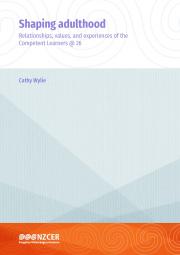
| Attachment | Size |
|---|---|
| 2.89 MB |
Summary
This longitudinal NZCER project has tracked the development of a group of learners from when they were in early childhood education, through school and into adulthood. Over the years, its findings have been well used in policy and practice. The final phase of the project returned to the cohort when they were 26. Two reports from this phase are now available, with a third report coming in late 2019.
How do New Zealanders in their mid-20s live? What matters most to them? We have some data from official statistics, media and online surveys, and research on particular issues. This report breaks new ground in providing a fuller picture of the experiences, values, relationships, and resources of young people shaping their adult lives.
These young people are part of the longitudinal Competent Learners study. We first met them when they were in their last few months of early childhood education in the Wellington region. They came from a wide range of social backgrounds, allowing us to see what role these played over time, but they are not a representative group of all New Zealanders—they are mainly Pākehā, and many continued formal education after school. In their mid-20s, they have somewhat higher qualifications and incomes overall than their peers. But they include people without work and people on low incomes—they broadly span the range of situations young people are in. They can give us some insight into the lives of this age group in contemporary Aotearoa New Zealand.
In 2014, 323 of the Competent Learners participants took part in an online survey, 303 a phone interview, and 19 in longer interviews. There are three reports from this phase. This report focuses on their values, use of leisure time, relationships, financial situation, wellbeing, and thoughts about New Zealand and their own future. Pathways, Labour Market Experiences, and Learning at Work and Beyond at Age 26 focuses on work and learning.




